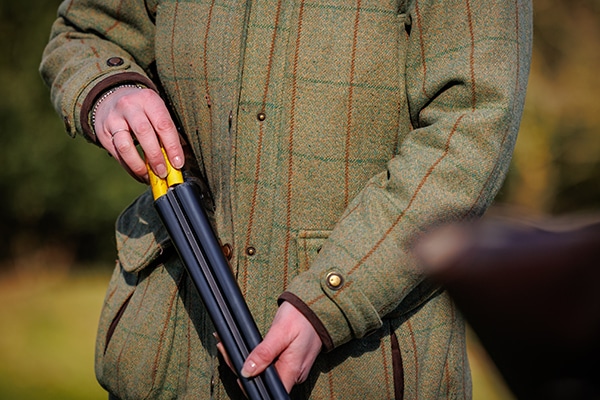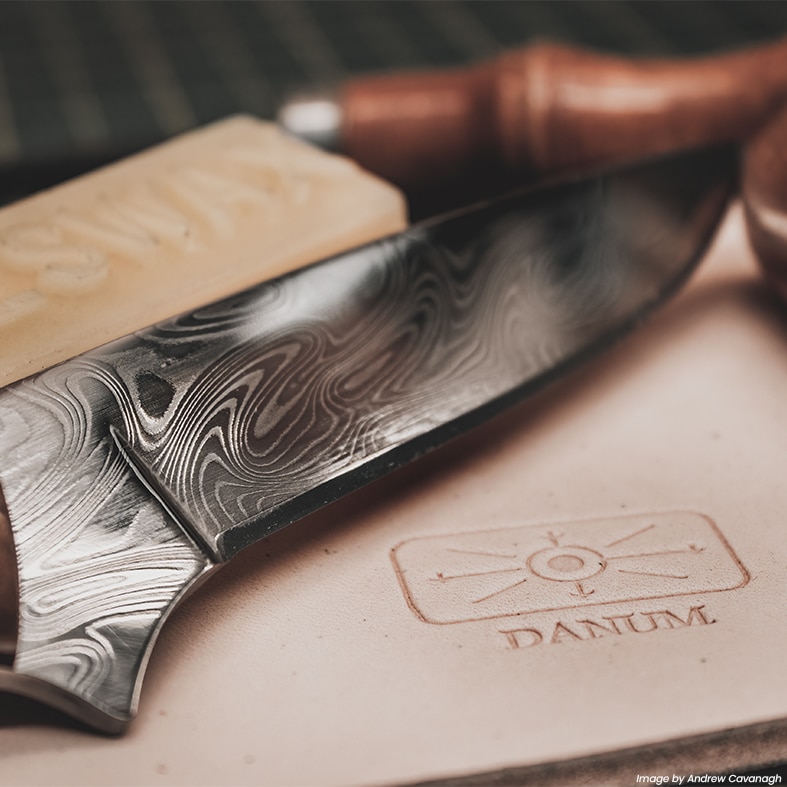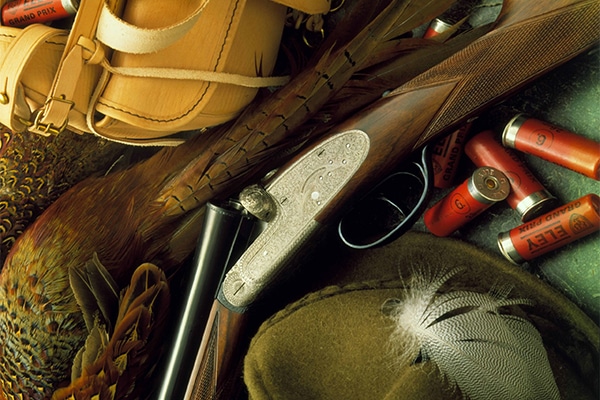
Shotgun safety
It is estimated there are more than 1.5 million shotguns held legally in Britain and this code of practice will ensure a safe and responsible future for the sport.
Get information on the legal shooting season for mammals and birds in the UK.
Apply for funding for your project or make a donation today
Comprehensive information and advice from our specialist firearms team.
Everything you need to know about shotgun, rifle and airgun ammunition.
Find our up-to-date information, advice and links to government resources.
Everything you need to know on firearms law and licensing.
All the latest news and advice on general licences and how they affect you.


The Custodial Sentences and Weapons Act 2007 and associated legislation requires a person to obtain a knife dealer’s licence if they are ‘carrying on business’ in the sale; hire; offering for sale or hire; exposing for sale or hire; lending; or giving of the following articles listed in (a) to (d) below. A licence is not required for private sales between individuals.
Knives (other than folding pocket knives whose blades do not exceed 3.5 inches (8.91 cm) in length or knives designed for domestic use);
(aa) daggers (other than kirpans or skean dhus whose blades do not exceed 3.5 inches (8.91 cm) in length);
knife blades (other than those designed for domestic use);
swords;
any other article;
which has a blade; or
which is sharply pointed,
and which is made or adapted for use for causing injury to the person.
The Scottish Government Executive Note that accompanies the legislation provides examples of other articles and includes ‘crossbow bolts’ and ‘arrows’.
NOTE: the term “article” is used within this BASC document and refers generically to the bladed instruments described at (a)-(d) above.
In the legislation the term “dealer” means a person carrying on a business which consists wholly or partly of:
selling;
hiring;
offering for sale or hire;
exposing for sale or hire;
lending; or
giving articles to a customer.
“selling” also includes:
selling such an article by auction;
accepting goods or services in payment (whether in part or in full) but does not include selling (by auction or otherwise) an article by one person on behalf of another.
NOTE: (ii) above ensures that the requirements for a licence apply to the owner of the goods rather than to any intermediary, such as an auction house or online marketplace.
A knife dealer’s licence is required by those which sell to private purchasers.
Sales etc. to persons acting in the course of business or a profession are excluded from these licensing provisions. For example, a knife manufacturer may sell freely to knife dealers without the need for a dealer’s licence.
Sales may also be made to other companies and professions such as carpet layers, butchers, laboratories etc, without the need for a dealer’s licence.
A “customer” means a person who buys, hires, borrows or otherwise acquires any article in a transaction with a dealer; and
A “transaction” means where an article is sold, hired, offered or exposed for sale or hire, lent or given to the customer by a dealer.
The Knife Dealers (Exceptions) Order 2009 exempts fencing teachers from the need to have a dealer’s licence.
Where a fencing sword is ‘hired’, ‘offered or exposed for hire’, ‘lent’ or ‘given’, these are not taken to be a business and do not require a dealer’s licence. ‘Fencing sword’ means a foil, epée or sabre.
The Knife Dealer’s Licence (Miscellaneous) (Scotland) Order 2010 introduced new exemptions from the need for a dealer’s licence. The exemptions allow the hiring, offering or exposing for hire, lending or giving of arrows used in the port or archery by a teacher to a pupil.
There is an identical exemption to hire etc a knife for water sports between a teacher and pupil but only where the purpose is the safety of the pupil whilst undertaking a water sport. An exemption has also been given for the hire etc of an arrow or fencing sword only in connection with and within the vicinity of a competition recognised by Scottish fencing, The Scottish Archery Association or the Scottish Field Archery Association.
The Knife Dealer’s Licence (Historical Re-enactment Events) (Scotland) Order 2011 introduces new exemptions from the need for a dealer’s licence.
The exemptions allow the selling, hiring, offering or exposing for sale of hire, lending or giving of archery arrows, knives, daggers, knife blades, swords or other bladed or sharply pointed articles, but only where that activity is undertaken “in connection with a historical re-enactment event” and within the event’s “immediate vicinity”.
NB: “historical re-enactment event” means an educational or entertainment event, to which members of the public are admitted on payment of money or money’s worth, and in which participants attempt to recreate aspects of a historical event or period (which includes, but is not limited to, battle re-enactment and combat demonstrations).
Where a person carries on business as a dealer in second-hand knives etc., then a second-hand dealer’s licence is required by the original Civic government (Scotland) Act 1982, in additional to a knife dealer’s licence (assuming that the licensing authority requires second-hand dealers’ licences for these classes of item).
The terms of the knife dealer’s licence take precedence over those of the second-hand dealer’s licence.
Where the sale and despatch of an article takes place in Scotland, but in separate premises in different local authority areas, the sale takes place at both locations. This means that a knife dealer’s licence will be required for both locations.
Where orders are taken and articles are despatched from separate premises, and only the place of despatch is in Scotland, then that place is treated as the place where the sale happens and for which a licence is required.
The Knife Dealer’s (Licence Conditions) Order 2013 places mandatory conditions on dealer’s licenses. They are:
Written records on the day of the transaction detailing the identity of the customer and the means by which identity was verified;
Confirmation that the customer was at least 18 years old including the specific form of ID used to verify age;
Description of the article sold, hired, lent or given to the customer;
Ensuring that any article or display of articles is not visible from the street or any public entrance to the premises;
Displaying a notice that states the regulations around the minimum age of purchase at the entrance to premises and the point-of-sale counter;
Retaining these records for three years.
Additional conditions where the item involved is a sword:
The dealer must take all reasonable steps to establish from the customer and confirm the intended use of any sword;
Written records stating the enquiries made of the customer, or other persons or bodies, as to the intended use of any sword.
A local authority has the power to place additional conditions to dealers’ licenses at their discretion, including the requirement for secure cabinets for display and/or CCTV cameras.
A licensing authority must cause public notice to be given of every application made to them for the grant or renewal of a knife dealer’s licence.
Constables and authorised officers may enter premises under a warrant issued by the sheriff or justice of the peace where they believe that unlicensed activity is taking place, or where an existing dealer is thought to be failing to comply with conditions of his or her licence.
An authorised officer must provide his or her authorisation and likewise a constable must produce his or her identification on arrival at any premises.
Authorised officers and constables are not entitled to enter or search premises or, as the case may be, remain there or continue to search the premises until they have produced their authority or identification.
It is an offence for a person without reasonable excuse to refuse entry to an authorised officer or constable to carry out the requirements of a Court warrant.
Items seized and removed from premises may be held until conclusion of any proceedings against the suspect.
Authorised officers and constables have the power to inspect and copy documents; it is an offence not to comply with these requests.
The Court may make a forfeiture order on seized property following a conviction for dealing without a licence, or failing to comply with licence conditions.
The legislation provides for a temporary licence to be granted for exhibitors to attend game fairs and trade shows in Scotland.
Applications should be made well in advance to the local authority for the area in which the event is taking place.
Please note that licences are not transferable. They will be restricted to an event and location. Multiple licences will need to be sought from the relevant local authorities if you wish to trade at a number of game fairs and events throughout the season.
If your application for a dealer’s licence is refused, you will be given 28 days from the receipt of the refusal notification to lodge an appeal with the Sheriff Court against the refusal, should you wish to do so.
The Custodial Sentences and Weapons (Scotland) Act 2007 ASP 17
The Custodial Sentences and Weapons Act 2007 – Explanatory Note EN ASP 17
The (Commencement No. 2 and Transitional Provisions) Order 2009 SSI No.197
The Knife Dealer’s (Licence Conditions) (Scotland) Order 2013 SSI 2013/22
The Knife Dealer’s (Licence Conditions) (Scotland) Order 2013 – Policy Note PN SSI 2013/22
The Knife Dealer’s (Exceptions) Order 2009 SSI No. 218
The Knife Dealer’s (Exceptions) Order 2009 – Executive Note EN 218
The Knife Dealer’s Licence (Miscellaneous) (Scotland) Order 2010 SSI No.311
The Knife Dealer’s Licence (Miscellaneous) (Scotland) Order 2010 – Executive Note EN 311
The Knife Dealer’s Licence (Historical Re-enactment Events) (Scotland) Order 2011 SSI No. 263
The Knife Dealer’s Licence (Historical Re-enactment Events) etc – Executive Note EN 263
Got a question? Email us on firearms@basc.org.uk or call 01244 573 010.
© BASC July 2023

It is estimated there are more than 1.5 million shotguns held legally in Britain and this code of practice will ensure a safe and responsible future for the sport.

Guidance on issues such as additional conditions on firearms certificates, the law around borrowing guns and access to shooting land.

This branch of the target-shooting sports has been growing in popularity over the past few years. It involves using either original old guns, or replicas of modern manufacture.